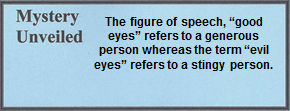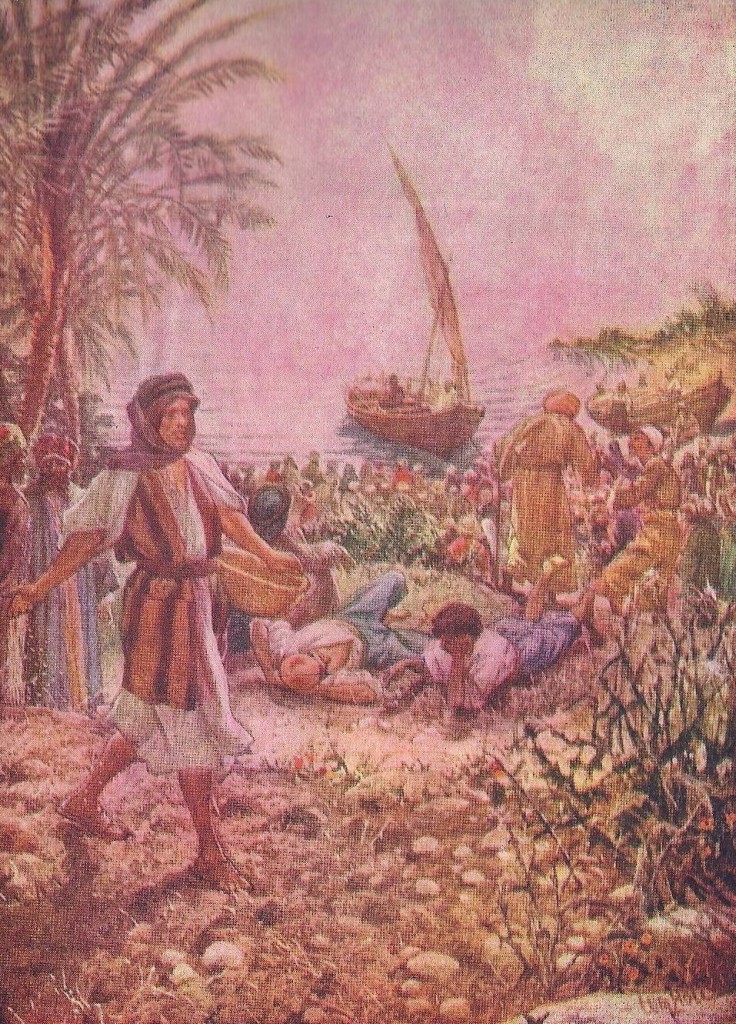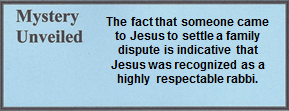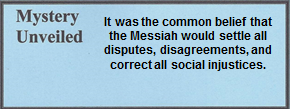09.02.02 Lk. 11:37-52
SIX WOES: HYPOCRISY CONDEMNED AMONG LEADING PHARISEES
37 As He was speaking, a Pharisee asked Him to dine with him. So He went in and reclined at the table. 38 When the Pharisee saw this, he was amazed that He did not first perform the ritual washing before dinner. 39 But the Lord said to him: “Now you Pharisees clean the outside of the cup and dish, but inside you are full of greed and evil. 40 Fools! Didn’t He who made the outside make the inside too? 41 But give from what is within to the poor, and then everything is clean for you.
42 “But woe to you Pharisees! You give a tenth of mint, rue, and every kind of herb, and you bypass justice and love for God. These things you should have done without neglecting the others.
43 “Woe to you Pharisees! You love the front seat in the synagogues and greetings in the marketplaces.
44 “Woe to you! You are like unmarked graves; the people who walk over them don’t know it.”
45 One of the experts in the Law answered Him, “Teacher, when You say these things You insult us too.”
46 Then He said: “Woe also to you experts in the law! You load people with burdens that are hard to carry, yet you yourselves don’t touch these burdens with one of your fingers.
47 “Woe to you! You build monuments to the prophets, and your fathers killed them. 48 Therefore, you are witnesses that you approve the deeds of your fathers, for they killed them, and you build their monuments. 49 Because of this, the wisdom of God said, ‘I will send them prophets and apostles, and some of them they will kill and persecute,’ 50 so that this generation may be held responsible for the blood of all the prophets shed since the foundation of the world — 51 from the blood of Abel to the blood of Zechariah, who perished between the altar and the sanctuary.
“Yes, I tell you, this generation will be held responsible.
52 “Woe to you experts in the law! You have taken away the key of knowledge! You didn’t go in yourselves, and you hindered those who were going in.”
The leading Pharisees who repeatedly confronted Jesus were extreme legalists who had no care for the common people, but only desired to provide for their own lucrative welfare. However, many other godly Pharisees desired to have a spiritual renewal among the people. They preached this message and there is little question they were a major influence for the overwhelmingly positive response John the Baptist had in his ministry. It is always a challenge to remember these two extremes of the Pharisees. They were not a homogeneous group, but rather, there was a group of corrupt aristocrats on one end of the spectrum while at the other there was the majority who had a true concern for the spiritual welfare of the people under their charge.
“Did not first perform the ritual washing before dinner.”[1] The Pharisees had disagreements among themselves concerning the application of various oral laws and regulations to daily life. These were subjects of debate between the two major schools of religious interpretation: the School of Hillel and the School of Shammai. The Mishnah records the philosophy of each as it pertained to the issue of washing before meals, which in the first century was a hotly debated subject.
These are the things wherein the School of Shammai and the school of Hillel differ in what concerns a meal. The School of Shammai says: “(On the Sabbath or a Festival-day) they say the Benediction first over the day and then over the wine.” And the School of Hillel says: “They say the Benediction first over the wine and then over the day.”
The School of Shammai says: “They wash the hands and then mix the cup.” And the School of Hillel says: “They mix the cup and then wash the hands.”
The School of Shammai says: “A man wipes his hands with a napkin and lays it on the table.” And the School of Hillel says: “(He lays it) on the cushion.”
The School of Shammai says: “They sweep up the room and then wash the hands.” The School of Hillel says: “They wash the hands and then sweep up the room.”
Mishnah, Berakoth 8.1-4[2]
The washing of hands became more than a physical act of rubbing the wet fist of one hand in the palm of the other; it had developed into a ceremonial ritual as follows: The hand was defined as that portion of the arm that was between the finger tips and elbow, including that area that today is known as the “forearm.” To wash properly, the tips of the fingers were joined together and lifted up so the water ran down to the elbows, then turned down so that the water could run off to the ground. The joined hands were lifted up again as fresh water was poured on the hands and the process was repeated three times. The water basin that was used was first held on the right side, then on the left; the water that was poured on the hands was first poured on the right side, then on the left.[3] When finished, the following prayer was recited, “Blessed art Thou who hast given us the command to wash the hands.”[4] Jewish scholars today debate whether, in the first century, the cup of blessing came first or the hand-washing ritual; whether the towel was placed on the table or elsewhere, etc. Furthermore, the rabbis from various schools of theology, such as Hillel and Shammai, had slightly different versions of the ritual.
It is interesting though, that the issue of cleanliness has continued for us today in the form of a common cliché, “Cleanliness is next to Godliness.” Just as the Pharisaic theology of cleanliness failed to make them holy before God, the modern expression has the same non-effect. There is no law in the Torah that requires this extreme level of hand washing. The rabbis had created “rabbinic Judaism” out of their traditions and thought that in doing so, they were worshiping God. And there is nothing in Scripture that affirms the cliché. It is only the blood of Jesus that brings one to Godliness.
“Woe to you Pharisees…. Woe also to you experts in the law!” The term woe is a dirge, a lament for the dead.[5] Clearly this was a sorrowful term of judgment. The leading Pharisees and the scribes were essentially of the same theological mindset in that they created their own Oral laws which they held in superior position to their Hebrew Bible. In addition, they selected choice verses and applied them to daily lives with extreme legalism. For example,
You must distinguish between the holy and the common, and the clean and the unclean.
Leviticus 10:10
In response, Jesus gave them dire warnings of impending consequences with the term woe. The phrase woe, which in Greek is ouai, and refers to both anger and sorrow.[6] Clearly Jesus was extremely upset with them,[7] and spoke forth a single word of pending judgment.
“Unmarked graves; the people who walk over them don’t know it. One of the reasons for whitewashing tombs was that they could be easily avoided by travelers. If one walked near a tomb or touched a dead body, he would be ceremonially defiled and could not participate in the religious celebrations such as Passover.[8] This was especially important for the priests and Levites who served in the temple. Therefore, two weeks prior to Passover, families would whitewash all tombs.
“Your fathers killed them.” Like their fathers, they too killed the “prophets.” From Abel in the book of Genesis to Zechariah in 2 Chronicles 24, which is the last book in the Jewish Bible (due to a different sequence of books than in Christian Bibles).[9] Jeremiah was persecuted endlessly to the point that he was driven into exile in Egypt, but eventually was recognized and honored.
Now, these men whom Jesus was addressing, would continue the sins of their fathers. The first martyr would be Jesus Himself, then Stephen, who was followed by James. While these three died in Jerusalem, they didn’t do the Apostle Paul any favors either. He was repeatedly scourged five times and often beaten up during his ministry. Eventually, ten of the twelve disciples died as martyrs. Unfortunately, the church has at times done likewise to its reformers.
“You build their monuments.” Literally: “You build their tombs.”[10] The question raised by scholars has been in reference to what tombs or monuments did Jesus refer to in this passage? It has been suggested that He referred to the Machpelah,[11] a huge tomb Herod built in Hebron over the graves of Abraham and the patriarchs. This was truly a monument of honor.[12]
The negative connotation of this passage suggests the tomb of Zechariah,[13] or the tomb of another righteous prophet or priest who was killed by the religious establishment. Many Jewish leaders of the Old Testament era had been violent against God’s prophets. Likewise in the Inter-Testamental era, both the leading Pharisees and Sadducees were violent against those who preached righteousness. Jesus said that the Jews tried to appease their guilt by the construction of memorial tombs[14] to honor one, and possibly others as well, whom they did not respect in life.
A Lesson in First Century Hermeneutics:
09.02.02.X Quoting The Overview Of Scripture
Today students are sometimes asked to read a book and, in a sentence or two, give a brief statement on what the book is about – an overview. A modern academic term is “thesis statement” – a one sentence summary sentence at the end of the first paragraph of an essay. First century rabbis also used summary statements. When Rabbi So-and-So “said” something, that does not mean a quotation, but it is a brief statement of the meaning or summary of what was said. Not understanding this basic principle leads observant Bible students to ask the following question:
09.02.02.Q1 Why did Jesus refer to passages in the Bible that do not exist?
A case in point is this statement: “Because of this, the wisdom of God said.” These words are from Luke 11:49, but there are no clear references to His quotation. Critics have highlighted such passages as proof of numerous errors in the Bible. But the appropriate response is found in the context of the Hebraic mindset.[15] When Jesus spoke to the Jews, they understood the context of the conversation,[16] meaning, they understood what Jesus was saying in the broad scope of Scripture. Obviously, if the context was not understood, those in His audience as well as the Pharisees would have been quick to identify the error that has been touted by modern critics. But they didn’t! Jesus referred to the Scriptures of the Old Testament in three ways:
- Directly,
- Indirectly and,
- In a broad general manner.
In Jewish thinking, there was no field of study more important than theology, which far outpaced the second most important field of study – a vocational trade.[17] When men gathered for a festival, after a synagogue service, or other social event, the subject of discussion was often theology, or the impact of Hellenism upon their world. Therefore, the average Jewish person was well grounded in both the Old Testament and Oral Tradition. As a result, it was easy for Jesus to make broad over-generalizations, as in John 17:12 and His listeners understood Him. Today, some 2,000 years later, scholars must reconstruct the setting and context of the event. Yet while the historical connections at times are difficult to put together, the theological meaning remains secure.
“This generation will be held responsible.” This phrase is a statement of promised judgment, yet God in His mercy gave the religious leaders the span of an entire generation to repent before judgment would be executed. A “generation” is generally recognized as a 40-year period even though women were married and began having children while in their mid-teen years. They were often grandmothers by their early thirties. The compassion of Jesus to withhold judgment against the religious leaders who knew and taught the Old Testament prophecies is quite evident. Therefore, they were entirely responsible for what they knew and what they rejected:
- The ministry and message of John the Baptist
- The ministry, miracles, and message of Jesus
- The miracles of nature at His death
- The resurrection and appearances of more than five hundred people
- His ascension
- The work of the Holy Spirit after the resurrection, namely on Pentecost
- The message and miracles of the apostles
- The testimonies of the first Jewish Christians
God gave them 40 years to repent, just as God had given the Israelites 40 years of punishment in the desert. Again, His mercy was demonstrated. However, this judgment was not just for the sake of Jesus but also for the other prophets God sent whom they rejected and killed previously. While previous Jews were punished by banishment and natural disasters, this time they associated Jesus with Beelzebub and punishment would be as no other in history. The discussion wherein Jesus condemned the hypocrisy of the leading Pharisees was the turning point for His ministry. The Kingdom of God was lost to them until the future Millennial Reign comes, but now His focus would be upon the soon-to-come Gentile church.
Until now Jesus often healed multitudes without their faith, but as His focus changed He required faith on the part of those who desired healing. In the meantime, some of His disciples were beginning to realize that He was, in fact, the Messiah. Knowing this, Jesus told them not to declare His Messiahship. Likewise, His teaching style was about to change. Rather than giving clear teachings, He began to teach in parables (i.e. Mt. 13 ff.), sometimes leaving His accusers more confused than angry.
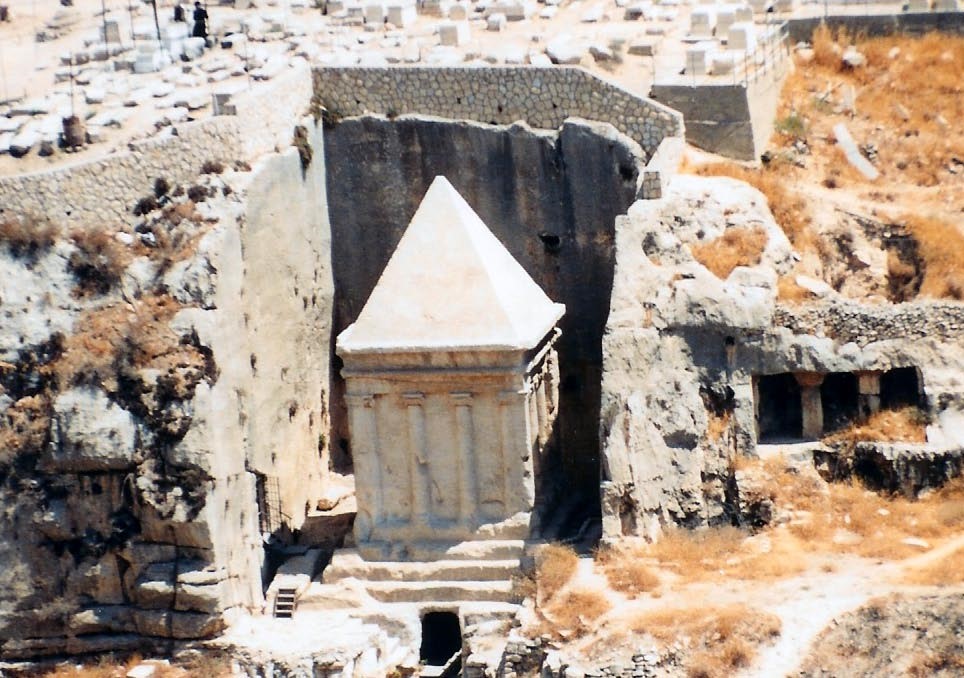
09.02.02.A. THE TOMB OF ZECHARIAH. Tradition says that the ornate tomb, located in the Kidron Valley between the Mount of Olives and Jerusalem’s eastern gate, was built for Zechariah as a recompense for his murder. However, the tomb reflects the architecture of two pagan cultures, Greek and Egyptian that Zechariah repudiated. In fact, the tomb is of an anonymous person who was a wealthy and prominent Jerusalemite, but not for Zechariah. Photograph by the author.
[1]. The evening meal was the “chief” meal of the day, usually held in the evening. It was the primary meal during the feasts, such as the Passover meal and marriage feast.
[2]. Danby, ed., Mishnah 8-9; Mishnah, Tohoroth 4.1 – 4.7.
[3]. Geikie, The Life and Words of Christ. 2:203.
[4]. This quotation may be a 4th century A.D. modification of the 1st century prayer, but regardless, it is essentially the same.
[5]. Smith, Augsburg Commentary on the New Testament: Matthew. 157, 274.
[6]. Lang, Know the Words of Jesus. 182.
[7]. See also 08.01.02, 11.02.05, and 13.05.02-05.
[8]. Freeman, The New Manners and Customs of the Bible. 507; Geikie, The Life and Words of Christ. 2:149-51.
[9]. The name Zachariah is at times spelled Zacharias. See also Lightfoot, A Commentary on the New Testament from the Talmud and Hebraica. 3:127. See also 13.05.05.Q1 concerning the identification of Zachariah/Zechariah.
[10]. Green, Interlinear Greek-English New Testament; Berry, Interlinear Literal Translation of the Greek New Testament.
[11]. The Machpelah is a huge building (see 03.05.31.A), exceedingly larger than any other massive tomb.
[12]. Buried there are Abraham, Isaac, Jacob, Sarah, Rebecca, and Leah. Missing is Rachel who died in childbirth near Bethlehem, where she was buried. See 03.05.31.A.
[13]. This may be a reference to the tomb of Zechariah (see 09.02.02.A).
[14]. Some scholars believe this may possibly include the tomb of Zechariah; see 09.02.02.A.
[15]. A partial list of other problematic passages is found in Appendix 13.
[16]. See the Law of Context (Part 1, No. 2) in Appendix 30.
[17]. See 02.03.04 “Education.”
